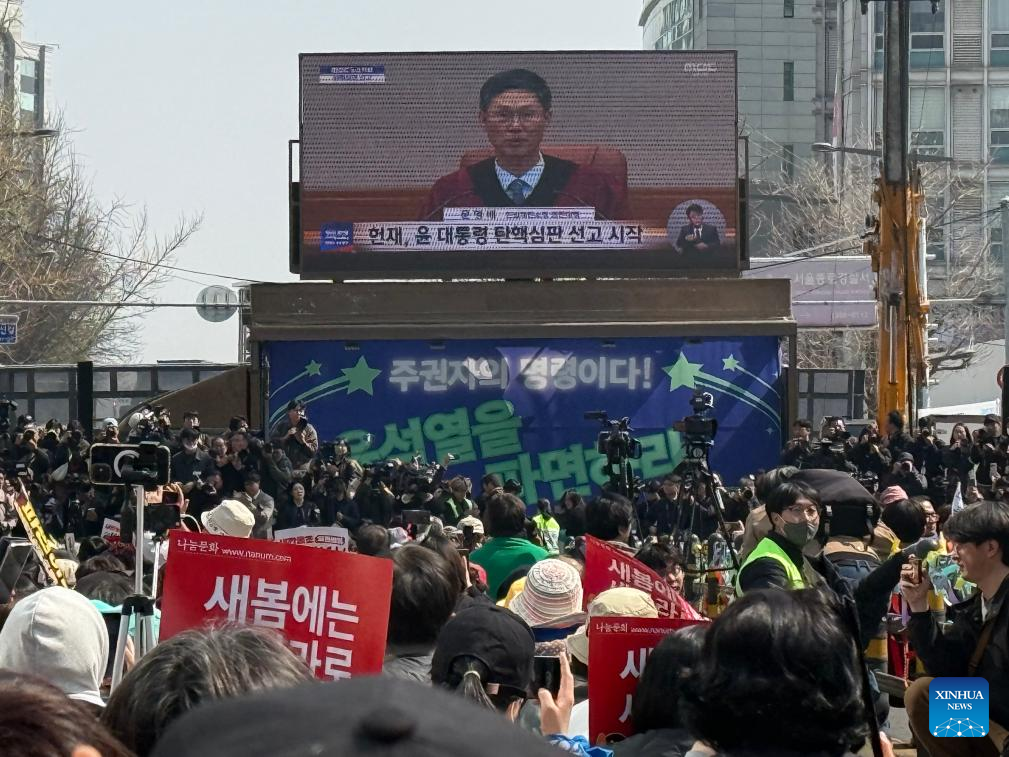
 0 Comment(s)
0 Comment(s) Print
Print E-mail Xinhua, April 4, 2025
E-mail Xinhua, April 4, 2025

People watch live broadcast of the ruling on the impeachment against President Yoon Suk-yeol by South Korea's constitutional court in Seoul, South Korea, April 4, 2025. South Korea's constitutional court upheld a motion by the National Assembly to impeach President Yoon Suk-yeol over his short-lived martial law imposition, live TV broadcast showed Friday. (Xinhua/Yao Qilin)
South Korea's constitutional court upheld a motion by the National Assembly to impeach President Yoon Suk-yeol over his short-lived martial law imposition, a live TV broadcast showed Friday.
Moon Hyung-bae, acting chief of the court, read a ruling on Yoon's impeachment, saying it was a unanimous decision of eight justices.
The acting chief said Yoon broke his duty of protecting the constitution as he damaged the constitutional institutions, such as the parliament, and violated the basic rights of people by mobilizing the military and the police.
Moon stressed that the benefit of protecting the constitution through Yoon's dismissal will overwhelmingly exceed the national loss from his dismissal.
Yoon declared an emergency martial law on the night of Dec. 3 last year, but it was revoked by the opposition-led National Assembly hours later.
Throughout the midnight hours of the botched martial law attempt, military helicopters landed at the National Assembly, and hundreds of armed special forces troops broke into the parliamentary building.
By law, the ruling comes into force immediately after the reading and a snap presidential election is required to be held within 60 days. The election is expected to fall in late May or early June.
The conservative leader officially lost all presidential power, becoming the country's second sitting president to be forcibly removed from power following former conservative President Park Geun-hye's ouster through impeachment in 2017.
Yoon also became the third president to be impeached by the National Assembly in the country's constitutional history. Late liberal President Roh Moo-hyun was reinstated in the presidency after impeachment by the National Assembly in 2004.
Since the passage of Yoon's impeachment motion on Dec. 14 last year, a total of 11 hearings have been held in the constitutional court until Feb. 25.
It took 111 days before the constitutional court's final verdict, compared to 92 days for Park's impeachment and 64 days for Roh's impeachment.
Yoon was apprehended in the presidential office on Jan. 15 and was indicted under detention on Jan. 26 as a suspected ringleader of insurrection, becoming the country's first sitting president to be arrested and prosecuted.
If convicted of being the insurrection ringleader, Yoon could face the death penalty or life imprisonment.
He was released on March 8 as the prosecution decided not to appeal against a court's release approval.
Go to Forum >>0 Comment(s)